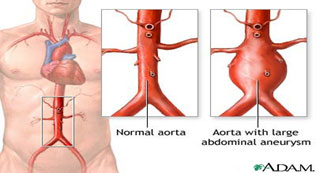What is an abdominal aortic aneurysm?
The aorta is the largest artery in the human body that begins at the heart and extends down into the abdomen where it splits into two arteries. It supplies blood to the body and is as thick as a garden hose. An abdominal aortic aneurysm (AAA or triple A) is the dilatation of a section of the aorta (described as a balloon-like bulge of the artery) in the abdomen. It is the most common of aortic aneurysms.

What causes an abdominal aortic aneurysm?
The exact cause of and AAA is unknown. Some risk factors might include smoking, atherosclerosis (hardening of the arteries), vasculitis (an infection in the aorta), high blood pressure, frequent alcohol consumption, connective tissue disorders, age, family history, and gender (more common in men).
How do I prevent an abdominal aortic aneurysm?
Some of the risk factors you cannot do anything about such as age, gender, and family history. Staying active and exercising, eating healthy, losing weight, stop smoking, and limiting alcohol consumption can decrease your chances of an AAA.
What are the symptoms of an abdominal aortic aneurysm?
Most people do not experience symptoms until the AAA is large. Aneurysms normally grow slowly, but some grow fast. This makes them difficult to detect. As the AAA increases in size, some symptoms might include a pulsating sensation near the belly button or a deep constant pain in the abdomen, side, or back. As the AAA enlarges the risk for the aneurysm to rupture greatly increases. A ruptured AAA can cause life-threatening bleeding because it is the main supplier of blood in the body.
What happens next?
Once an abdominal aortic aneurysm is found, doctors will closely monitor it so that surgery can be planned if it's necessary. Most often these are monitored, but surgery may be required depending on the size. The risk for an AAA to rupture is greater if symptoms are present, so surgery normally is planned. Emergency surgery for a ruptured AAA is very urgent and can be complicated. Your family doctor will most likely refer you to a cardiothoracic surgeon for evaluation.
Who do I contact with any additional questions?
You can contact your family doctor who referred you for the screening.

